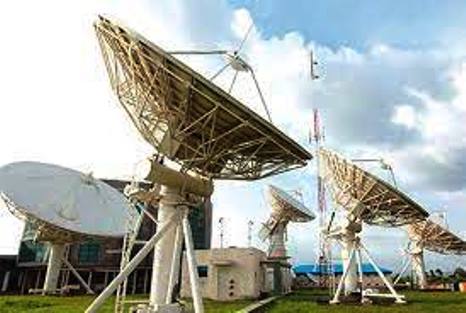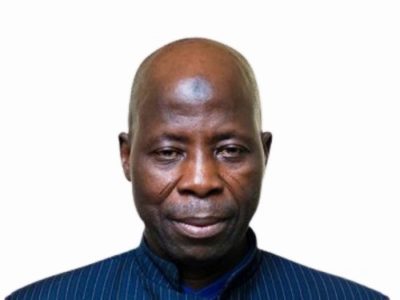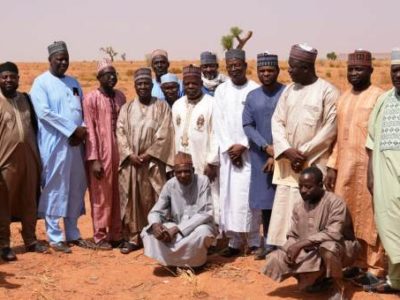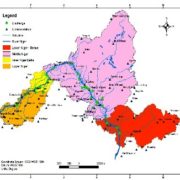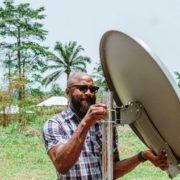Nigeria communication satellite company NIGCOMSAT Limited has developed an electronic voting (e-Voting) solution that could help the country stamp out electoral rigging. The home grown solution developed by a team of Nigerian engineers in NIGCOMSAT Limited, Abuja is designed round biometric-based voters’ register that cannot be duplicated or stolen. The newly developed solution holds promises to address one of Nigeria’s greatest aches since independence in 1960. Its promoters are convinced it also holds the ace to help Nigeria’s President Goodluck Jonathan fulfill one of his promises to Nigerians.
If President Goodluck Jonathan has repeated nightmares on leading Nigeria forward, it will be the task of how to achieve free and fair elections in 2011;only about 12 months away.
Africa’s most populous country of 150 million people has in the last 50 years failed to achieve credible elections. The consequences have included serial political violence, marred international image and less than zero respect for elected political office holders.
Nigeria has about 60 million registered voters spread across about 120,000 thousand polling centers. At any national elections such as will be the case in 2011, there will be over 4,000 candidates vying for about 1458 seats in the national and state houses of assemblies. Others are the presidency seat, and the gubernatorial seats of the 36 states with the exclusion of Edo and Anambra States. With more than 500,000 officials required to be trained to conduct the elections, a free and fair election has remained a formidable task.
In NIGCOMSAT Limited, Lugbe, Abuja, Ahmed Rufai, chief executive officer and managing director of the communication satellite company leads a team of Nigerian engineers to develop the “e-Voting system based on radio Frequency identification technology which uses a contact-less card system with enhanced security features like triple DES, PES, AES all embedded in a voting card.” If adopted by the Independent National Electoral Commission (INEC), Nigeria will join other bigger democracies such as India and the United States of America that have already deployed information technology tools to speed up and enhance the electoral processes.
NIGCOMSAT is likely to get a listening ear in President Jonathan, who recently opened a Facebook page to become the first Nigerian president to use a social media Information Technology (IT) tool to interact with citizens. As one presidency source puts it in Abuja, “the president has demonstrated his belief in technology to break borders for communication with the people.” The president, a former university don, “has also affirmed that technology will play a role in how he achieves his mandate for Nigeria including credible elections.”
For many critics, President Goodluck may have set the tone for how he wants things done rightly with his appointment of the well known radical Prof Atahiru Jega as the new head of INEC. Until his appointment, Jega was the Vice Chairman of Bayero University, Kano. The president had sacked the former INEC boss Prof Maurice Iwu who had gained notoriety for conducting some of Nigeria’s worst political elections in 2007. Jonathan has made attainment of credible 2011 elections one of his utmost tasks.
The presidency is already aware of what NIGCOMSAT has achieved and is already exploring the question of ‘if the system can be implemented at a large scale and whether it can be executed at all giving the time frame before the elections.’ Rufai is convinced the new solution could help the president achieve his goal of a credible election. “It holds a lot of promise to address one of the toughest challenges facing our democracy,” said Rufai during a formal visit by the Minister of Science and Technology Prof. Muhammed K. Abubakar to inspect NIGCOMSAT facility and acquit himself with agencies and departments under his ministry.
An impressed Prof. Abubakar said NIGCOMSAT has been able to justify the immense investment by the country in hundreds of engineers trained to acquire the high skills in the satellite industry. The eVoting solution foster on precise communication algorithm is a direct outcome of this investment in capacity building. According to him, the team of engineers at NIGCOMSAT has proven that only Nigerians can solve their own problems and that the eVoting solution is a sure proof that the solution to Nigeria ’s problems lie at home. For Abubakar, the elixir for Nigeria’s worrisome aches has been discovered by the Nigerian communications satellite company.
“Based on what I have seen here today, I am highly impressed and confident enough to say that my ministry has developed a comprehensive solution for an electronic voting system that will ensure that every votes counts. I will bring this to the attention of Mr. President and the INEC Chief for appropriate action. With what the young engineers here have developed, biometric-based voters’ register can be produced before Dec. 2010 by NIGCOMSAT given the necessary financial support. They have all that is takes to do this.”
If implemented, Nigeria will join India, considered the world’s largest democracy. ‘In 2004, India had adopted Electronic Voting Machines (EVM) for its elections to the Parliament with 380 million voters had cast their ballots using more than a million voting machines. The Indian EVMs are designed and developed by two Government Owned Defense Equipment Manufacturing Units, Bharat Electronics Limited (BEL) and Electronics Corporation of India Limited (ECIL). Both systems are identical, and are developed to the specifications of Election Commission of India. The System is a set of two devices running on 6V batteries.
‘One device, the Voting Unit is used by the Voter, and another device called the Control Unit is operated by the Electoral Officer. Both units are connected by a 5 meter cable. The Voting unit has a Blue Button for every candidate, the unit can hold 16 candidates, but up to 4 units can be chained, to accommodate 64 candidates. The Control Units has Three buttons on the surface, namely, one button to release a single vote, one button to see the total number of vote cast till now, and one button to close the election process. The result button is hidden and sealed, It cannot be pressed unless the Close button is already pressed.’
NIGCOMSAT Limited was founded to manage and advance Nigeria communication satellite projects. Through the company and in partnership with the Chinese government, Nigeria launched Africa’s first communication satellite, NIGCOMSAT-1, which covered a distance of 35,700 kilometres from the earth. The satellite was launched from a military base in China in May 13, 2007. NIGCOMSAT-1 developed fault in orbit over a year later and a replacement satellite NIGCOMSAT-1R is due for launch in 2011. Part of the mandate of NIGCOMSAT Limited is to develop communication and communication related technologies that could resolve the country’s problems and earn it a hot spot in the global space communication industry.
The solution is cost effective according to Rufai. It provides a broad base multiplex of foolproof solutions at a fraction of what INEC sought to do in the last 2007 election but which was never implemented. Being home- rown, the solution eliminates the need for to spend the country’s foreign exchange (FOREX) on offshore eVoting solutions and also it addresses the core of Nigeria’s electoral rigging problems as clearly understood by the team of indigenous engineers who are all Nigerians.
“It is cost effective; NIGCOMSAT already has the production line equipments in-place except for the copy and paste equipment which is meant for mass production. It has also been demonstrated to be efficient because it is user friendly, a simple guide is embedded in the system and as soon as an individual confirms his or her candidate selection, the cast is recorded and sent to a central server, the system is also designed in such a way that each candidate can monitor the votes coming in and for whom. Remember also that the pool of engineers involved is in federal government employment. By way of comparison, total cost of ownership will be 20 times as much if imported from abroad as against being produced by NIGCOMSAT,” said Rufai in Abuja.
NIGCOMSAT already has many advocates in the National Assembly convinced that the country can benefit from electronic voting system. One of the strongest advocates is Senator Ayo Arise, representing Ekiti North. For Arise, eVoting is the panacea for Nigeria’s electoral fraud. Most people are skeptical about electronic voting because they are ignorant of how it works. “I have been an advocate of electronic voting. I believe it is one way to resolve many of the problems associated with election rigging. However, nobody seems to be listening to me. People have been saying it will be manipulated and that Nigerians will not be able to understand and use it.
“E-voting is not rocket science. People will get used to it. All they need is proper education on usage. When the Global System for Mobile Communications was introduced into the country, there was initial scepticism, but today, most Nigerians have known how to operate GSM. The advantages of e-voting far outweigh its disadvantages. The system is equipped with a lot of devices to check rigging. The machines are equipped with 12 hours of battery life in case of power outage. This is one solution that will guarantee free and fair elections.”
INEC tried to adopt variants of eVoting solution in the 2007 elections designed to capture and store voters’ biometric and pictorial details. But after investing over 40 billion naira in the entire project through several contractors, INEC never got the process off the ground. Completely fostered on importation of foreign software and hardware solutions, the “investment was fraught with several cases of corruption against INEC officials; poor implementation of the technology involved and non-implementation of the specified contract terms of the technology scheme to enhance the use of biometric indices in the 2007 election,” as one report summed up the entire project.
According to Rufai, “Nigcomsat e-Voting system is based on Radio Frequency Identification technology which uses a contact-less card system with enhanced security features like triple DES, PES, AES all embedded in a voting card. The registered voter ID with his passport photograph and finger print will be on the card to show that he is eligible to vote. A voter’s finger print will be screened against his card for authenticity and detect multiple registration.
“Once the finger matches with the one on the card, the voter is then eligible to vote. After a choice of candidate has been made, a printout of the political party, person, time and place he voted will be given to him with a copy placed in the ballot box. This will prevent multiple registrations and voting. The system also displays full names and pictures of candidates for various offices being contested for as registered by INEC along with names and logos of political parties they belong to.


